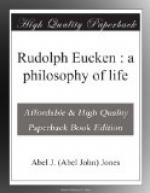Having arrived at this conclusion, he searches the story of the past, studies the conditions of the present, and gazes into the maze of the future, and finds revealed in them all an eternal something, unaffected by time, which was, is, and ever shall be—the eternal, universal, spiritual his, which then must be the great reality.
Upon this basis he builds a system of philosophy, which he considers to be more satisfactory than the solutions already offered; with which contention, there is little doubt, the majority of his readers will be inclined to agree.
After the brief statement of Eucken’s special problem, of the purpose and methods of his investigation, we can proceed to outline his theories in greater detail, beginning in the next chapter with his discussion of the solutions that have in the past been offered and accepted.
CHAPTER II
Has the problem been solved?
What is the meaning, the value, and purpose of life, and what is the highest and the eternal in life—the great reality? This is the question that Eucken would solve. Before attempting a solution of his own, he examines those that have already been offered. His discussion of these theories is remarkable for the fairness, breadth of view, sympathy, insight, and accurate knowledge that is shown. There is no superficial criticism, neither does he concern himself with the inessential details of the theories.
Jest-books tell us of a defendant against whom a claim for compensation was made by a complainant who alleged that the former’s dog had bitten him. The defence was, first, that the dog was lame, blind, and toothless; second, that it had died a week before; and third, that the defendant never possessed a dog. A sensible judge would wish to be satisfied in regard to the third statement before wasting time discussing the others; if it proved to be true, then the case would be at an end. The defences of philosophical systems are often similar, and the critic is tempted to waste time discussing details when he should go to the root of the matter. Eucken does not fall into this error. His special method is to seek the idea or ideas which lie at the root of the proposed solution; if these are unsatisfactory, then he does not consider it necessary to discuss them further. Hence his work is free from the flippant and superficial argument so common to-day; he makes a fair and serious endeavour to find out the truth (if any) that is at the basis of the proposed solutions, and does not hesitate to give them their due meed of praise even though he considers them to be ultimately unsatisfactory.
Before a solution can be regarded as a satisfactory one, Eucken holds that it should satisfy certain conditions. It should offer an explanation for life which can be a firm basis for life, it must admit of the possibility of human freedom, and must release the human being from sordid motives—unless it satisfy these conditions, then it cannot be accepted as final.




